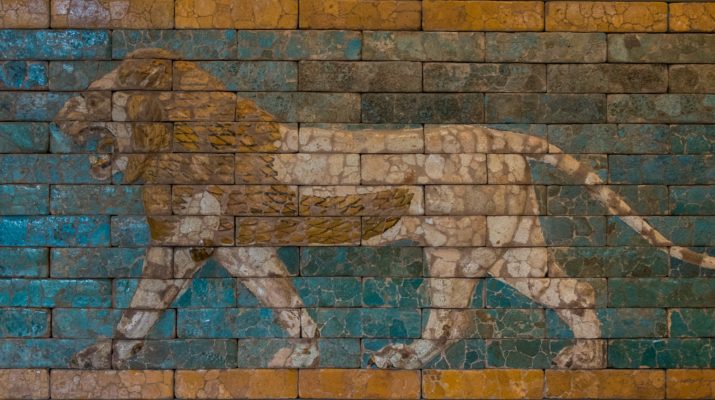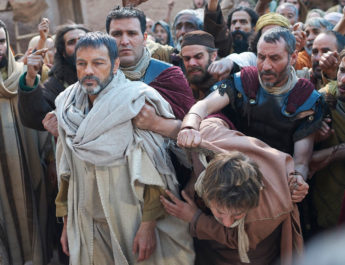2 Timothy 4:6-8, 16-18
Ordinary C48
6 As for me, I am already being poured out as a libation,A and the timeB of my departureC has come.D
A “poured out as a libation” = spendo. 2x in NT. This is to make a liquid offering, pour a libation.
B “time” = kairos. This is season, opportunity, occasion. The word chronos is used for chronological time. Kairos is used for spiritually significant time – the right time or appointed time.
C “departure” = analusis. 1x in NT. From analuo (to unloose, depart, break up; can also be figurative); {from ana (up, again, back, among, between, anew) + luo (to loose, release, untie; figuratively, to break, destroy, or annul; releasing what had been withheld)}. This is a loosing or departing. It can be used to describe releasing the yoke from animals.
D “come” = ephistemi. From epi (on, upon, what is fitting) + histemi (to stand, place, set up, establish, stand ready, stand firm, be steadfast). This is to stand upon, happen, be present. Usually, it is used in a literal sense.
7 I have foughtE the goodF fight;G
E “fought” = agonizomai. Related to “fight” in v7. 8x in NT. From agon (see note G below). This is to struggle, strive, or fight. It could be contending to win a prize or against an adversary or in war. It can also mean striving to accomplish something. This is where the word “agonize” comes from.
F “good” = kalos. This is good, noble, beautiful, correct, or worthy. This is external signs of goodness like beauty, demonstrations of honorable character, showing moral virtues. A different word, agathos, speaks of intrinsic good.
G “fight” = agon. 6x in NT. From ago (lead, bring, carry, drive, go). This can refer to a gathering or contest – as an athletic competition such as a race. It can also refer to conflict, struggle, opposition or a fight. It is used figuratively in a positive sense – as fighting the good fight of faith. It is also used in a negative figurative sense for effort or anxiety. Properly, this word refers to a place where people gather, which implies the game or contest.
I have finishedH the race;I I have keptJ the faith.K
H “finished” = teleo. From telos (an end, aim, purpose, completion, end goal, consummation, tax; going through the steps to complete a stage or phase and then moving on to the next one). This is to complete, fulfill, accomplish, end.
I “race” = dromos. 3x in NT. From dramein (to run) OR from trecho (to run, make progress, rush; running like an athlete in a race; figuratively, to work quickly towards a goal in a focused way). This is a course, race, or career. It is a track for those who run on foot in a competitive game. Figuratively, it can refer to a career or other course of life. It is part of the word “hippodrome.”
J “kept” = tereo. From teros (a guard or a watch that guards keep); perhaps related to theoreo (gazing, beholding, experiencing, discerning; looking at something to analyze it and concentrate on what it means; the root of the word “theatre” in that people concentrate on the action of the play to understand its meaning); from theaomai (to behold, look upon, see, contemplate, visit); from thaomai (to gaze at a spectacle; to look at or contemplate as a spectator; to interpret something in efforts to grasp its significance); from theoros (a spectator or envoy). This is to guard, observe, keep, maintain, or preserve. It can also be used f iguratively for spiritual watchfulness. It is guarding something from being lost or harmed – keeping an eye on it. Contrast the Greek phulasso, which is to guard something so that it doesn’t escape. Also contrast koustodia, which generally denotes a fortress or military presence. This word can mean fulfilling commands, keeping in custody, or maintaining. It can also figuratively mean to remain unmarried.
K “faith” = pistis. From peitho (to have confidence, urge, be persuaded, agree, assure, believe, have confidence, trust). This is less about knowing, believing, and repeating a list of doctrines then it is about trusting God. Faith means listening to God and seeking to live a holy life even (and especially) when we don’t understand how everything works or fits together. Faith is about being faithful (trusting and doing) rather than being all knowing.
8 From now onL there is reservedM for me the crownN of righteousness,O
L “from now on” = loipon. 13x in NT. From loipos (the rest, remained, remnant, other, residue); from leipo (to leave behind, be lacking). This is what remains, from now on, finally.
M “reserved” = apokeimai. 4x in NT. From apo (from, away from) + keimai (to lie, recline, be set, appointed, destined; to lie down literally or figuratively). This is to appoint, put away, store, reserve, await.
N “crown” = stephanos. 18x in NT. From stepho (to twine, encircle). This is something that surrounds i.e. a crown or garland. Properly, this refers to the wreath or garland that the winner of athletic games would win. It symbolized victory and honor from skill as contrasted with a royal crown, which is diadema in Greek. This is the word used for the crown that the saints in heaven wear in, for example, Revelation 4:4.
O “righteousness” = dikaiosune. From dikaios (correct, righteous – implies innocent; this is that which conforms to God’s notion of justice, uprightness); from dike (the principle of justice; that which is right in a way that is very clear; a decision or the execution of that decision; originally, this word was for custom or usage; evolved to include the process of law, judicial hearing, execution of sentence, penalty, and even vengeance; more commonly, it refers to what is right); may be from deiknumi (to show, point out, exhibit; figurative for teach, demonstrate, make known). This is judicial or divine approval of character or action. This is righteousness, justice, justness, divine righteousness.
which the Lord,P the righteousQ judge,R
P “Lord” = Kurios. From kuros (authority, supremacy). This is a respectful address meaning master or sir. It refers to one who has control or power greater than one’s own. So, it was also applied to God and Jesus as Master or Lord.
Q “righteous” = dikaios. Related to “righteousness” in v8. See note O above.
R “judge” = krites. 19x in NT. From krino (to judge, decide, think good, condemn, determine, pass judgment, stand trial, sue; judging whether in court or in a private setting; properly, mentally separating or distinguishing an issue – to come to a choice or decision, to judge positively or negatively in seeking what is right or wrong, who is innocent or guilty; can imply trying, condemning, punishing, or avenging). This is judge or ruler.
will giveS me on that day,T and not onlyU to me
S “give” = apodidomi. From apo (from, away from) + didomi (give, offer, place, bestow, deliver; give in a literal or figurative sense). This is to give back, return, give away. It is to restore as when one makes payment – to rend what is due, to sell.
T “day” = hemera. Perhaps from hemai (to sit). This is day, time, or daybreak.
U “only” = monon. From monos (alone, single, remaining, mere, desolate); from meno (to stay, abide, wait, endure). This is merely, only, simply, sole. It can also imply alone.
but also to allV who have longedW for his appearing.X
V “all” = pas. This is all or every.
W “longed” = agapao. Perhaps from agan (much). This is love, longing for, taking pleasure in. It is divine love or human love that echoes divine love.
X “appearing” = epiphaneia. 6x in NT. From epiphanes (manifest, glorious, conspicuous, memorable); from epiphaino (to shine on, give light to); {from epi (on, upon, among, what is fitting) + phaino (to bring light, cause to appear, shine, become visible or clear)}. This is manifestation, appearing, brightness. It is literally the word “epiphany” comes from.
16 At my firstY defenseZ no one came to my support,AA but all desertedBB me. May it not be countedCC against them!
Y “first” = protos. From pro (before, first, in front of, earlier). This is what is first, which could be the most important, the first in order, the main one, the chief.
Z “defense” = apologia. 8x in NT. From apologeomai (to make an accounting or defend oneself – particularly in court; present proof or evidence using sound logic); {from apo (from, away from) + logos (word, statement, speech, analogy; a word that carries an idea or expresses a thought, a saying; a person with a message or reasoning laid out in words; by implication, a topic, line of reasoning, or a motive; can be used for a divine utterance or as Word – Christ); from lego (to speak, tell, mention)}. This is a verbal defense, especially in a legal setting, that is well reasoned to respond to the issue at hand. It is an apology, clearing, plea, or vindication.
AA “came to…support” = paraginomai. From para (from beside, by) + ginomai (to come into being, to happen, become, be born; to emerge from one state or condition to another; this is coming into being with the sense of movement or growth). This is to arrive, appear, reach. It implies appearing publicly.
BB “deserted” = egkataleipo. Related to “from now on” in v8. From en (in, on, at, by, with) + kataleipo (to leave or leave behind, abandon, forsake, leave in reserve); {from kata (down, against, throughout, among) + leipo (see note L above)}. This is left behind, left as a remainder, desert, forsake. Properly, it means to leave someone or something wanting or lacking – so, to forsake or cause someone to be helpless in a serious scenario.
CC “be counted” = logizomai. Related to “defense” in v16. From logos (see note Z above). This is this is to compute or reckon up, to count; figuratively, it is coming to a conclusion or decision using logic; taking an inventory in a literal or figurative sense.
17 But the Lord stood byDD me and gave me strength,EE so that through me the messageFF
DD “stood by” = paristemi. Related to “come” in v6. From para (from beside, by) + histemi (see note D above). This is literally to place by stand. It can mean to present, exhibit, appear, bring, stand by, or prove. It can also mean to be ready, to assist, to yield, or to commend.
EE “gave…strength” = endunamoo. 7x in NT. From en (in, on, at, by, with) + dunamoo (to empower, strengthen, enable); {from dunamis (might, strength, physical power, efficacy, energy, and miraculous power; force literally or figuratively – the power of a miracle or the miracle itself). This is to give someone power or ability, to grow or make strong, make able.
FF “message” = kerugma. 9x in NT. From kerusso (proclaim, preach, publish; properly, to act as a herald – announcing something publicly with confidence and/or to persuade). This is proclamation – both the preaching and that which is preached. Sometimes times used to refer to the Gospel itself.
might be fully proclaimedGG and all the gentilesHH might hearII it.
GG “be fully proclaimed” = plerophoreo. 6x in NT. From pleres (to be full, complete, abounding in, or occupied with); {from pletho (to fill, accomplish, supply; to fill to maximum capacity)} + phoreo (to bear constantly or habitually or repeatedly; it can mean to wear or carry a burden); {from phero (to bear, bring, lead, make known publicly; to carry in a literal or figurative sense)}. This is to fulfills, fully convince, satisfy, accomplish, fully assure. It can be to fully convince by using evidence or to make full.
HH “gentiles” = ethnos. Probably from etho (a custom or culture). This is people who are united by having similar customs or culture. Generally, it is used to refer to Gentiles. This is a tribe, race, nation, or Gentiles in general. This is where the term “ethnicity” comes from.
II “hear” = akouo. This is hear or listen, but it also means to understand by hearing. This is where the word “acoustics” comes from.
So I was rescuedJJ from the lion’sKK mouth.LL
JJ “rescued” = rhuomai. 18x in NT– including from the Lord’s prayer “deliver us from evil”. Related to eruo (to draw or drag) OR related to rheo (to flow, overflow). This is to rescue or set free. It is to deliver from danger, to snatch up.
KK “lion’s” = leon. 9x in NT. This is lion, which is where our word “lion” comes from.
LL “mouth” = stoma. Perhaps from tomoteros (sharp, keener); from temno (to cut). This is mouth, speech, language, the tip of a sword, an opening in the ground.
18 The Lord will rescue me from everyMM evilNN attackOO
MM “every” = pas. Same as “all” in v8. See note V above.
NN “evil” = poneros. From poneo (to toil); related to ponos (pain, trouble, labor, distress, suffering; toil, which implies anguish); from the base of penes (a laborer, poor person, starving or indigent person; someone who works for their living); from pernomai (working for a living; laborer, poor person; to work for daily bread); from peno (to toil to survive day by day). This is bad, evil, wicked, malicious, grievous, or toilsome. Properly, it is something that bears pain – it emphasizes the miseries and pains that come with evil. By contrast, the Greek kakos refers to evil as part of someone’s core character. Also contrasting the Greek sapros, which deals with falling away from a previously embodied virtue. This word can mean ill, diseased, morally culpable, derelict, vicious, malicious, or guilt. It can also refer to the devil or sinners.
OO “attack” = ergon. From ergo (to work, accomplish, do). This is work, task, deed, labor, effort.
and savePP me for his heavenlyQQ kingdom.RR
PP “save” = sozo. From sos (safe, rescued, well). This is to save, heal, preserve, or rescue. Properly, this is taking someone from danger to safety. It can be delivering or protecting literally or figuratively. This is the root that “savior” and “salvation” come from in Greek.
QQ “heavenly” = epouranios. 19x in NT. From epi (on, upon, what is fitting) + ouranos (air, sky, the atmosphere, heaven; the sky that is visible; the spiritual heaven where God dwells; implies happiness, power, and eternity); {perhaps from oros (mountain, hill)}. This is heavenly, celestial, high, heavenly one, heavenly thins. It is the heavenly sphere in contrast to the earthly one, the place of spiritual activity. Figuratively, it can mean divine or spiritual. Properly, this describes that which is fitting from heaven’s perspective.
RR “kingdom” = basileia. From basileus (king, emperor, sovereign); probably from basis (step, hence foot; a pace); from baino (to walk, to go). This is kingdom, rule, authority, sovereignty, royalty, a realm.
To him be the glorySS forever and ever.TT Amen.UU
SS “glory” = doxa. From dokeo (to have an opinion, seem, appear, suppose; a personal judgment; to think); from dokos (opinion). This is literally something that evokes a good opinion – something that connects to our understanding of intrinsic worth. The ultimate expression of this is, of course, God and God’s manifestation. So, this is opinion, honor, and dignity, but also praise, glory, renown, and worship.
TT “forever and ever” = eis + ho + aion + ho + aion. Literally, “to the ages of the ages.” Aion is from the same as aei (ever, always, unceasingly, perpetually; on every occasion). This is an age, cycle of time, course, continued duration. It is also used to describe the eternal or forever. This is the word used to discuss the present age or the messianic age.
UU “amen” = amen. From Hebrew amen (verily, truly, amen, truth, so be it, faithfulness); from aman (to believe, endure, fulfill, confirm, support, be faithful, put one’s trust in, be steadfast. Figuratively, this is to be firm, steadfast, or faithful, trusting, believing, being permanent, morally solid). This word is literally firmness, but figuratively fidelity, faithfulness, honesty, responsibility, trust, truth, steadfastness. Properly, it is to be sure, certain, or firm. This is a word of emphasis indicating that something crucial follows.
Image credit: “Babylonian Lion Passing” from the Processional Way of Babylon. Photo by 0x010C, 2015.




